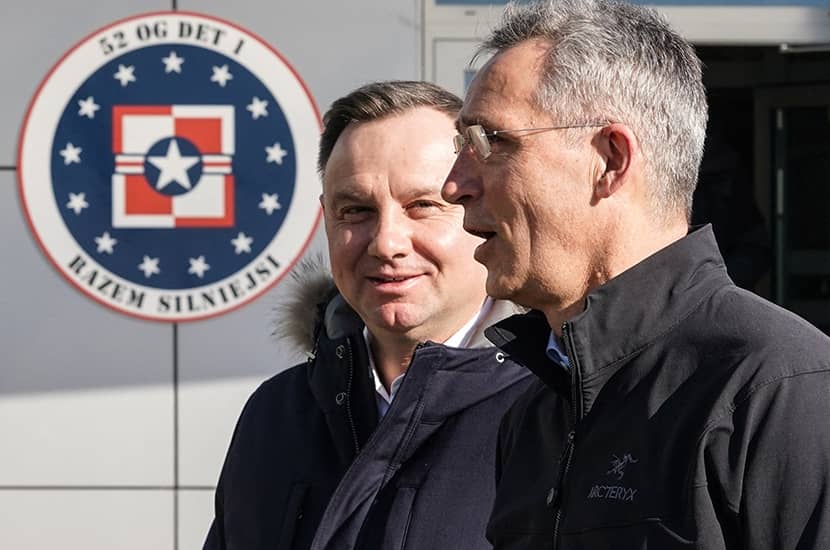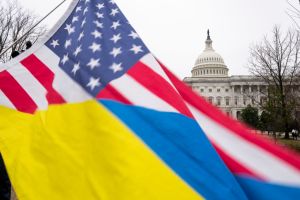The Polish government has for years been something of a pariah on the liberal international stage. Poland’s ruling Law and Justice party, which is firmly on the political right, is at odds with the EU establishment, particularly over its judicial reforms, which critics say will threaten the key democratic principle of separation of constitutional powers. The EU accuses Poland of undermining the “rule of law” and the European Commission is, as a result, withholding the billions of euros that Poland is due from the Union’s coronavirus recovery fund.
Russia’s invasion of Ukraine could transform all that. The war raises some almighty diplomatic, economic, security and humanitarian challenges for Poland as Ukraine’s neighbor. Yet it also gives Warsaw a huge opportunity to increase its diplomatic and military profile as a key strategic regional player. Given Poland’s critical geographical location, and the fact that it is NATO’s largest member and top spender on defense in the region, the country now plays a pivotal role in the alliance’s security relationship with Moscow.
Poland’s government and Law and Justice-backed President Andrzej Duda must feel vindicated, having spent years trying to persuade the international community to develop a common, robust response to what they always saw as Vladimir Putin’s neo-imperialist destabilization of eastern Europe. Warsaw tirelessly pushed Europe to ensure that sanctions on Moscow were maintained and extended.
For a long time, Law and Justice also criticized Germany and other western powers for their conciliatory approach towards Moscow over the heads of their European allies. A particular point of contention was the Nord Stream 2 gas pipeline, which runs directly from Russia to Germany across the bed of the Baltic Sea and bypasses Poland and Ukraine.
As everyone knows, Berlin has belatedly suspended its approval of the pipeline and is going further, reversing its historical non-intervention policy, sending weapons to Ukraine and increasing its defense spending. Informed observers believe that the Polish, specifically Prime Minister Mateusz Morawiecki, played a pivotal role in persuading Germany to change course.
Poland is moreover the main supply point for military equipment to Ukraine, even if the US on Tuesday rejected Poland’s offer of MiG-29 jets as part of the war effort. It has also received international recognition for the positive way that its government and citizens have responded to the wave of more than one million refugees that have so far fled across its eastern border to escape the armed conflict.
The crisis has further given Law and Justice a chance to mend fraught relations with the US. Warsaw had enjoyed very strong ties with Joe Biden’s predecessor Donald Trump, whom it came to see as a conservative soulmate. This, together with Biden’s pivot back to developing stronger ties with the EU political establishment (especially Germany), made it considerably more difficult for Warsaw to pursue its international goals with a Democrat in the Oval Office.
Relations had already started to improve in December when Duda vetoed a controversial media law that the US felt threatened the commercial interests of TVN, the American-owned Polish broadcaster, which takes a strongly anti-Law and Justice editorial line. The confusion with Washington over the MiG-29 jets may prove to be a setback, but Poland is already the main destination for new US troops arriving in the region since January — the tip of NATO’s eastern spear.
The Law and Justice government is hoping that all this will allow it to return to its previous twin-track approach to EU relations. On the one hand, it accepts that there will be disagreements with the EU political establishment on rule of law and culture-war issues. Law and Justice’s attachment to traditional morality and national identity is in stark contrast to the socially liberal, cosmopolitan consensus that predominates among western European cultural and political elites.
At the same time, Law and Justice tries to present Poland as a positive and constructive member of the EU. It is eager to develop closer economic ties with western allies as well as pragmatic working relations on important day-to-day policy issues.
The EU political establishment’s linking of funding to “rule of law” compliance represents a major challenge to Poland’s twin-track strategy. Yet even before the Russian invasion, the Law and Justice government and Duda had been making a concerted effort to de-escalate the dispute with Brussels: mainly to secure Polish access to EU funds, but also to help the West present a united front in the face of Moscow’s aggression. Now, with a war under way, Warsaw can stress its positive contribution to European unity over and above these policy disputes.
For the moment at least, the overwhelming imperative is for European leaders to put aside their differences and face the Ukrainian crisis together, so there is little appetite for raising the profile of contentious issues such as the rule of law dispute.
How long will this spirit of togetherness last? Poland has still not received the money it is due from the coronavirus fund. Brussels is determined on these points. On March 2, a week after the armed conflict began, the Commission published guidelines on how a new rule of law instrument for EU funds would be implemented. Displays of unity are all well and good, but political calculations are still being made behind the scenes. Tensions between the Law and Justice party and the EU political establishment are sure to re-surface when more “normal” patterns of political contestation resume.
This article was originally published in The Spectator’s UK magazine. Subscribe to the World edition here.


















